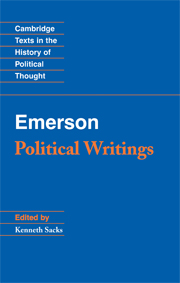Book contents
- Frontmatter
- Contents
- Acknowledgements
- Introduction
- Chronology
- Bibliographical note
- Selections from Nature: Introduction
- Selections from Nature: Language
- Journal entries: 1837
- The American Scholar
- The Divinity School Address
- Uriel
- Concord Hymn
- Letter to Martin Van Buren, President of the United States
- Self-Reliance
- Compensation
- Concerning Brook Farm
- Man the Reformer
- Politics
- Journal entries: 1840 and 1844
- Ode: Inscribed to W. H. Channing
- Address to the Citizens of Concord
- Webster and 1854
- Journal entry: 1851
- Woman. A Lecture Read Before the Woman's Rights Convention, September 20, 1855
- Napoleon; or, the Man of the World from Representative Men
- Speech at a Meeting for the Relief of the Family of John Brown
- John Brown. Speech at Salem
- Fate
- Power
- Journal entry: 1862
- Index
- CAMBRIDGE TEXTS IN THE HISTORY OF POLITICAL THOUGHT
Selections from Nature: Introduction
Published online by Cambridge University Press: 05 June 2012
- Frontmatter
- Contents
- Acknowledgements
- Introduction
- Chronology
- Bibliographical note
- Selections from Nature: Introduction
- Selections from Nature: Language
- Journal entries: 1837
- The American Scholar
- The Divinity School Address
- Uriel
- Concord Hymn
- Letter to Martin Van Buren, President of the United States
- Self-Reliance
- Compensation
- Concerning Brook Farm
- Man the Reformer
- Politics
- Journal entries: 1840 and 1844
- Ode: Inscribed to W. H. Channing
- Address to the Citizens of Concord
- Webster and 1854
- Journal entry: 1851
- Woman. A Lecture Read Before the Woman's Rights Convention, September 20, 1855
- Napoleon; or, the Man of the World from Representative Men
- Speech at a Meeting for the Relief of the Family of John Brown
- John Brown. Speech at Salem
- Fate
- Power
- Journal entry: 1862
- Index
- CAMBRIDGE TEXTS IN THE HISTORY OF POLITICAL THOUGHT
Summary
Nature is but an image or imitation of wisdom, the last thing of the soul; nature being a thing which doth only do, but not know.
PlotinusOur age is retrospective. It builds the sepulchres of the fathers. It writes biographies, histories, and criticism. The foregoing generations beheld God and nature face to face; we, through their eyes. Why should not we also enjoy an original relation to the universe? Why should not we have a poetry and philosophy of insight and not of tradition, and a religion by revelation to us, and not the history of theirs? Embosomed for a season in nature, whose floods of life stream around and through us, and invite us by the powers they supply, to action proportioned to nature, why should we grope among the dry bones of the past, or put the living generation into masquerade out of its faded wardrobe? The sun shines to-day also. There is more wool and flax in the fields. There are new lands, new men, new thoughts. Let us demand our own works and laws and worship.
Undoubtedly we have no questions to ask which are unanswerable. We must trust the perfection of the creation so far, as to believe that whatever curiosity the order of things has awakened in our minds, the order of things can satisfy. Every man's condition is a solution in hieroglyphic to those inquiries he would put. He acts it as life, before he apprehends it as truth. In like manner, nature is already, in its forms and tendencies, describing its own design.
- Type
- Chapter
- Information
- Emerson: Political Writings , pp. 1 - 2Publisher: Cambridge University PressPrint publication year: 2008



